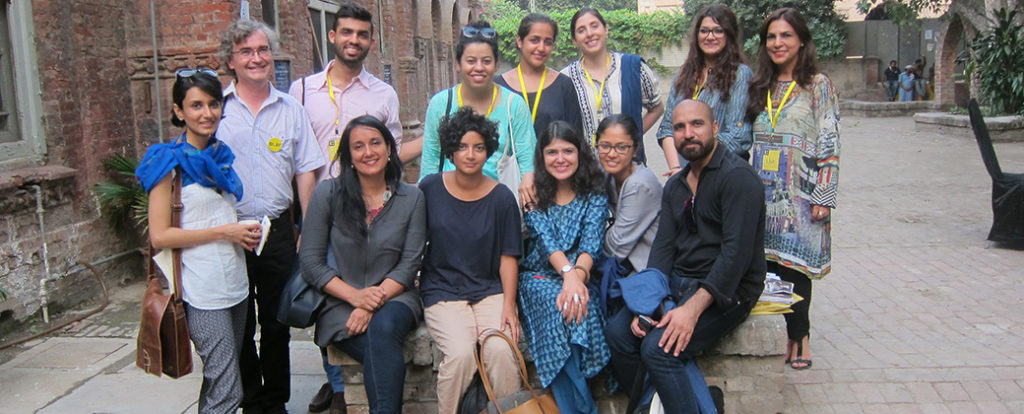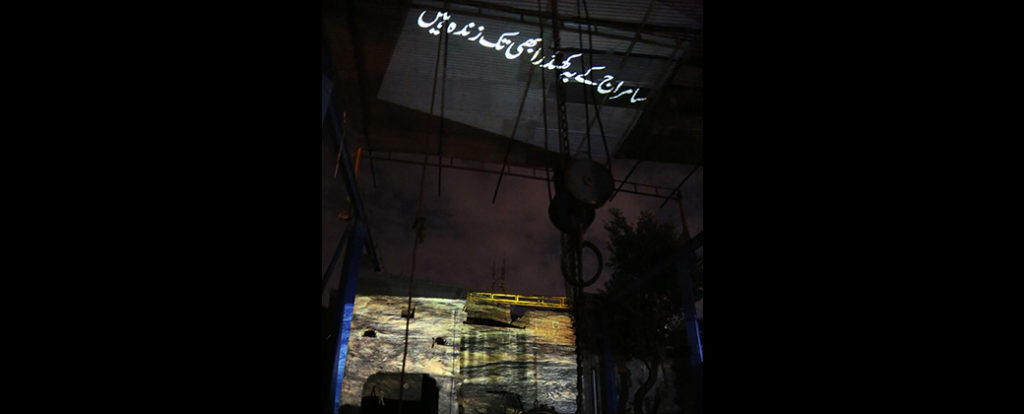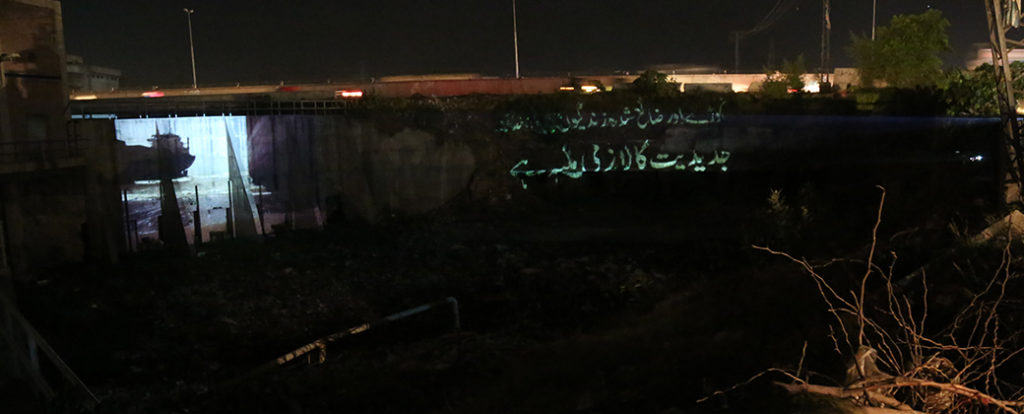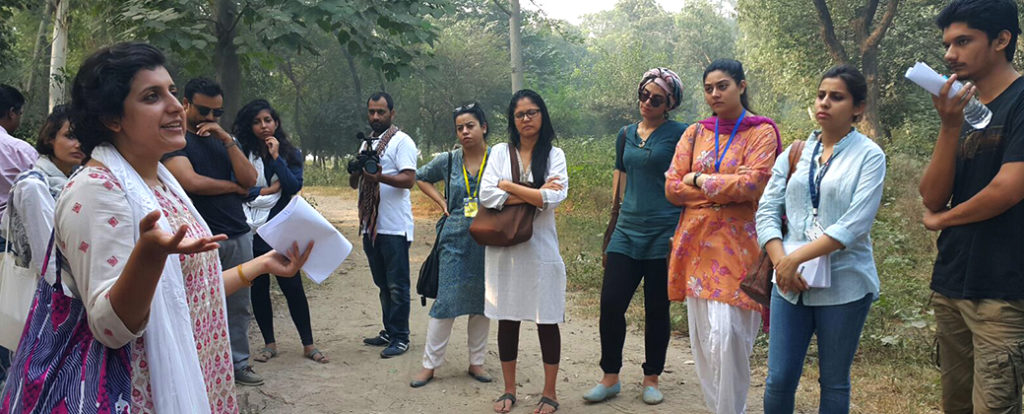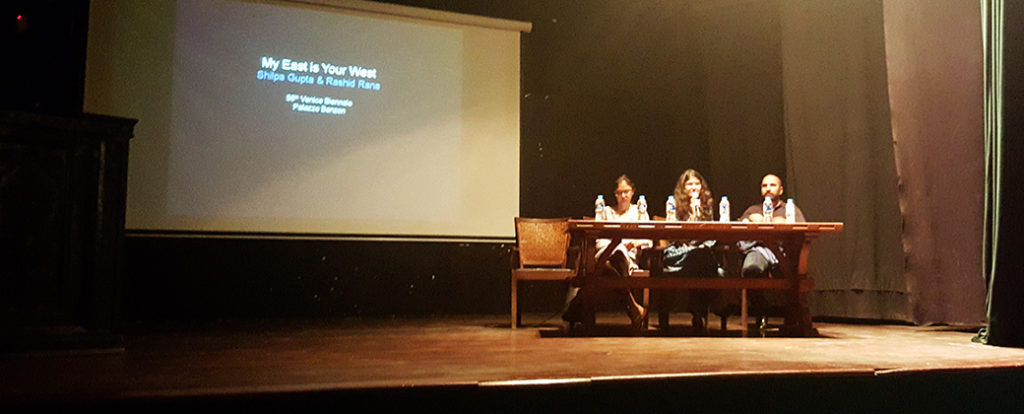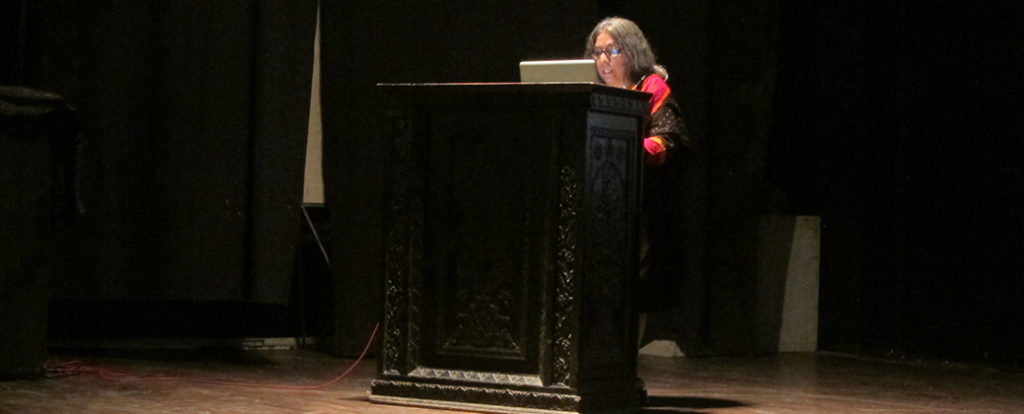ANCESTORS: Architecture of Memory
WorkshopThis public program curated by Natasha Ginwala was envisioned as a multi-part, interdisciplinary platform for the Gujral Foundation’s project My East is Your West, which in turn was part of the 56th Venice Biennale (2015) as a collateral event. Internationally recognized artist Shilpa Gupta (from Mumbai) was also featured in the project and in fact, its title is borrowed from one of her light installations. Questions of geographic connectivity, colonial history, a millennia-old tradition of hospitality, acculturation and oral memory in the Indian Subcontinent were raised throughout the travelling conversation enabled by the program, which hosted several leading South Asian as well as international artists, writers, theorists, architects and filmmakers. The program took place on September 19 & 20, 2015 at the National College of Arts.
Ancestors: Architecture of Memory (Episode #4: Lahore)
Episode four of the program marked the closing of The Viewing, The Viewer and The Viewed, an installation that was Rashid Rana’s contribution to My East is Your West. The two-day seminar and workshop program was held in collaboration with the Lahore Biennale Foundation (LBF) and participants included Naazish Ataullah, Urvashi Butalia, the Tentative Collective, Leela Gandhi, Shilpa Gupta, Salima Hashmi, Quddus Mirza, Rashid Rana, Ritu Sarin and Tenzing Sonam, Syma Tariq.
The Gandi Engine Commission by the Tentative Collection
This experimental, site-specific workshop navigated through the river Ravi to explore themes of development, destruction and the resulting waste. As a nod to the Persian meaning of Ravi, which is narrator, the Tentative Collective chose the river as a site for reframing stories from colonial histories to the neo-colonial present. The ‘Gandi Engine’ (dirty engine) itself is a water treatment plant off the Ravi that served as the namesake for the workshop, which looks at the river as a receptacle for the sewage spilling out of the city.
While numerous commissions have been undertaken to reverse this devastation of the Ravi, this particular one was simply an exercise in moving through space and time, allowing one to pause and reflect upon our relationship as urban dwellers to the landscape and ecology we inhabit.
A Thousand Channels by Syma Tariq
The audio project began as a series of radio episodes that traced the journey of Ancestors. Through modes of conversations, field recordings, sound walks, films, archival reportage and musical work, the clips that formed A Thousand Channels built a sonic schema that pre-empted the project, attempting to aurally interrogate our perception of place in the partitioned subcontinent.
The project was installed at the NCA gallery and outside Rashid Rana’s project at Liberty Market from September 19 to 21, 2015, with The State (Dubai) Radio Appartments22 (Rabat) serving as online collaborators.
The Gujral Foundation
Founded in 2008 by Mohit and Feroze Gujral, son and daughter-in-law of renowned Indian Modernist artist Satish Gujral, the foundation is a non-profit trust dedicated to supporting contemporary cultural engagements within the realms of art, design and culture in the Indian Subcontinent. Amongst other projects, The Gujral Foundation has arranged the loan of Aspinwall, the primary location of the Kochi Muziris Biennale 2012 and 2014 and has supported the 55th Venice Biennale, South Asian artists at the 8th Berlin Biennale for Contemporary Art and the Guggenheim Museum, New York exhibition, V. S. Gaitonde: Painting as Process, Painting as Life (2014). For the past three years, The Gujral Foundation has fostered a range of projects, steadily expanding its reach within the world of contemporary art, and it is committed to building infrastructures that sustain cultural freedom, social engagement and the artistic imagination.
Speakers
Natasha Ginwala is a curator, researcher, and writer. Recent projects include ‘My East is Your West’ featuring Shilpa Gupta and Rashid Rana at the 56th Venice Biennale, ‘Mind Moves Matter’ at L’ appartment 22, ‘8th Berlin Biennale’ for Contemporary Art (with Juan A. Gaitán), the multi-part curatorial project Landings presented at Witte de With Cente’ for Contemporary Art, David Roberts Art Foundation, NGBK (as part of the Tagore, Pedagogy and Contemporary Visual Cultures Network), Stedelijk Museum Amsterdam, and other partner organizations (with Vivian Ziherl) as well as The Museum of Rhythm at Taipei Biennial 2012 (with Anselm Franke). Ginwala was a guest curator at HKU – University of the Arts Utrecht (2015). She has written on contemporary art and culture in journals such as The Exhibitionist, e-flux Journal, Ibraaz, Afterall and has contributed to numerous publications.
Rashid Rana was born in Lahore, Pakistan, where he lives and works. He trained as a painter at the National College of Arts in Lahore and the Massachusetts College of Fine Arts in Boston. He is the founding faculty member and the dean of the School of Visual Arts and Design at Beaconhouse National University in Lahore. Recent solo exhibitions include a major mid-career retrospective of seventy works, entitled Labyrinth of Reflections at Mohatta Palace Museum, Karachi (2013), as well as survey shows at Cornerhouse, Manchester (2011) and Musée Guimet, Paris (2010). Participation in major group exhibitions includes the Dhaka Art Summit (2014), the Kiev Biennial (2012), Pacific Asia Museum, Pasadena, Fotomuseum Winterthur, Whitechapel Gallery and Saatchi Gallery, London (2010), the Asia Society, New York (2009), the fifth Asia Pacific Triennale, Queensland Gallery of Art, Brisbane and the Singapore Biennial (2006), Asian Art Biennial at the National Fine Arts Museum, Taichung, and Fukuoka Triennial (2005).
Shilpa Gupta is an internationally renowned artist. She has had solo exhibitions in Asia, Europe and the United States, in recent years including: Contemporary Art Center, Cincinnati; Museum voor Moderne Kunst, Arnhem; MAAP Space, Brisbane; Arnolfini, Bristol; the OK Center for Contemporary Art, Linz. Her work has been shown at Tate Modern, London, Guggenheim Museum, New York, Louisiana Museum, Humlebæk, Mori Museum, Tokyo, the Devi Art Foundation, New Delhi and the Dhaka Art Summit. Gupta has taken part in the New Museum Triennale, New York; the Lyon Biennale, curated by Hou Hanru; the Biennale of Gwangju, directed by Okwui Enwezor and curated by Ranjit Hoskote; the Triennale of Yokohama, curated by Hans Ulrich Obrist; the Biennale of Liverpool, curated by Gerardo Mosquera; and more recently the Biennale of Sharjah, curated by Yuko Hasegawa; the 8th Berlin Biennale for Contemporary Art, curated by Juan Gaitán with artistic team member Natasha Ginwala.
Urvashi Butalia is Co-founder of Kali for Women, a feminist publishing house, and is currently Director, Zubaan, an imprint of Kali. An active participant in women’s movement for more than two decades, she writes and publishes widely on a range of issues relating to gender. Among her best known publications is the award winning history of Partition: The Other Side of Silence: Voices from the Partition of India.
Leela Gandhi is Professor of English at the University of Chicago. She has held visiting professorships in Australia, Denmark, India, Italy and Iran. Her publications include Postcolonial Theory: A Critical Introduction (1998), the co-authored, England Through Colonial Eyes in Twentieth Century Fiction (2001), Measures of Home: Selected Poems (2000), Affective Communities: Anticolonial Thought, Fin de Siècle Radicalism, and the Politics of Friendship (2006). Her new book The Common Cause: Postcolonial Ethics and the Practice of Democracy, 1900-1955 (2014) engages the confluence of democracy and ethics at the scene of early twentieth-century anti-colonialism and anti-fascism. Leela Gandhi is a founding co-editor of the journal Postcolonial Studies and editorial board member of Postcolonial Text. She is a Senior Fellow of the School of Criticism and Theory at Cornell University.
Ritu Sarin and Tenzing Sonam have been making films for over 25 years. They are based in Dharamshala in North India. Their documentary films include the award-winning The Reincarnation of Khensur Rinpoche (1991), The Trials of Telo Rinpoche (1993), and The Shadow Circus: The CIA in Tibet (1998), all commissioned by the BBC. Their documentary, The Sun Behind the Clouds (2009), won the Vaclav Havel Award at the One World Film Festival in Prague. The latest documentary, When Hari Got Married, premiered at Films From the South, Oslo, and has been shown at DOK Leipzig and IDFA Amsterdam. They also made the Tibetan feature film, Dreaming Lhasa (2005), executive production by Jeremy Thomas and Richard Gere, which premiered at the 2006 Toronto International Film Festival. Video installations include, Some Questions on the Nature of Your Existence (2007), which was exhibited at Thyssen-Bornemisza Art Contemporary in Vienna, the Mori Art Museum in Tokyo, and the Busan Biennale. Sarin and Sonam are also directors of the Dharamshala International Film Festival, which they founded in 2012, now one of India’s leading independent film festivals.
Syma Tariq is a freelance journalist, editor and independent researcher. She works as a correspondent for Monocle in Portugal, and is also a copy editor for The Guardian’s news and opinion desks. She is a regular contributor to Monocle24 radio, covering urbanism and social issues, politics, business and culture. In currently developing the audio project A Thousand Channels, she is slowly considering a field recording practice relating to spaces of migration and trade. Syma is also co-programmer at Waterfalls, a platform for musical and sonic collaborations in the form of live events and independent releases. She is based in between Lisbon and London.
Professor Naazish Ata-Ullah is an artist, art educator, curator, writer and human rights activist who lives and works in Lahore, Pakistan. She retired in 2010 as Principal National College of Arts, Lahore and NCA Rawalpindi Campus. The Republic of France awarded her the title of Knight in the Order of Arts and Literature, for services to art and culture. At present she is a Senior Fellow at the School of Visual Art and Design, Beaconhouse National University, Lahore. Professor Ata-Ullah was the curator of Rashid Rana’s mid-career retrospective at the Mohatta Palace Museum in Karachi in 2013. She co-edited and contributed to Labyrinth of Reflections: the art of Rashid Rana 1992-2012.
Salima Hashmi is an acclaimed artist, art historian and curator from Pakistan. She was most recently the Founding Dean of Beaconhouse National University, School of Visual Arts until her retirement in 2015. Previously she taught at the National College of Arts for 35 years, and was Principal of the institution for four years.
Professor Hashmi has written several books, including Unveiling the Visible- Lives and Works of Women Artists of Pakistan, and most recently The Eye Still Seeks – Contemporary Art of Pakistan.
In 2009, Professor Hashmi curated, ‘Hanging Fire’, an exhibition of Pakistani contemporary art at the Asia Society Museum in New York, which included renowned Pakistani artists such as Rashid Rana, Imran Qureshi and Faiza Butt.
Professor Hashmi was awarded the President’s Medal for Pride of Performance for Art Education in 1999 by the Government of Pakistan.
Quddus Mirza is an artist, art critic and curator. He is the Head of Fine Arts Department at the National College of Arts (NCA), Lahore, where he also studied his BFA, before acquiring his MA in painting from the Royal College of Art (RCA), London.
He has also curated a number of exhibitions throughout Pakistan including ‘Trade Union’ at Zahoor ul Akhlaq Gallery, NCA and “Celebrating Art” at National Art Gallery, Islamabad. Mirza has also curated shows in India and the UK, most notably ‘Beyond Borders: Art from Pakistani’ at National Gallery of Modern Art in Mumbai, India.
Currently, Mirza contributes a regular weekly column for Pakistan’s major newspaper, The News, and the editor of the online magazine Art Now Pakistan. He has contributed to major publications locally and internationally and is also the co-author of book, 50 Years of Visual Arts in Pakistan.
Curated by Natasha Ginwala (Episode #4: Lahore)
